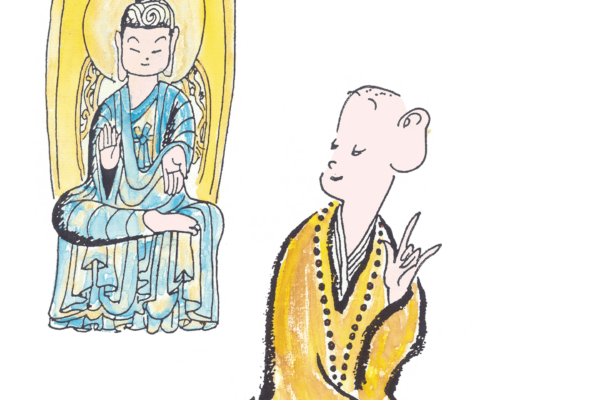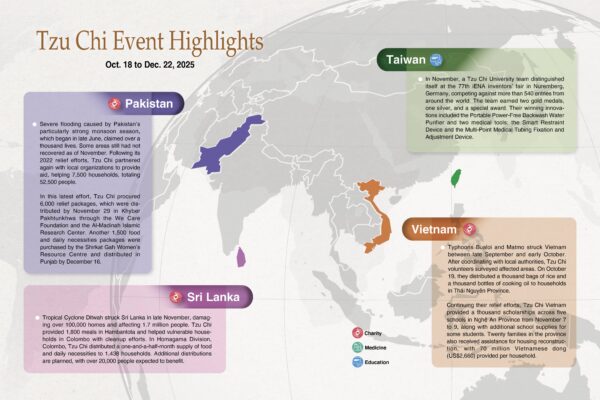By Yeh Tzu-hao
Edited and translated by Wu Hsiao-ting
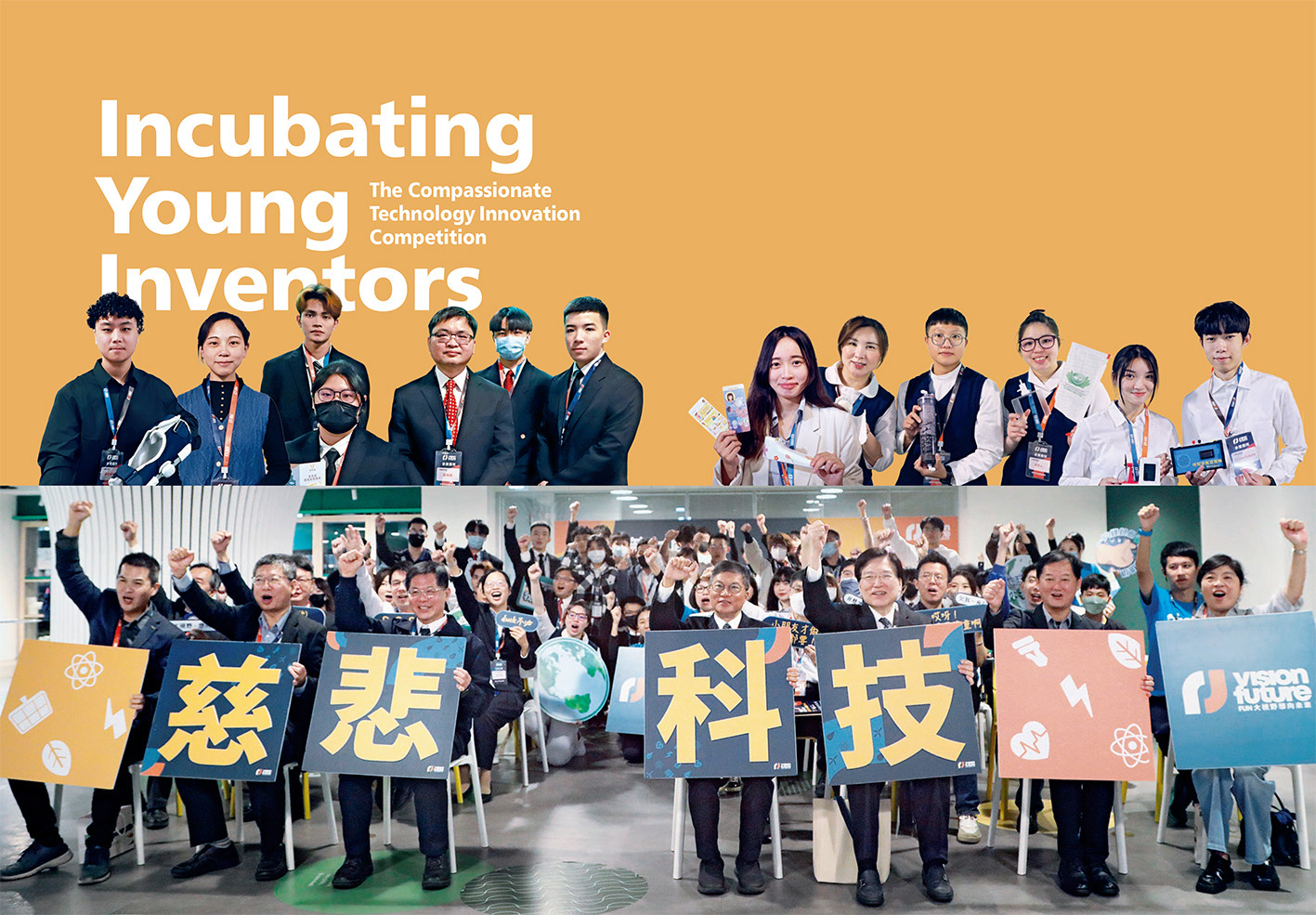
Photos by You Jun-hong and Liu Wei-xing
The Compassionate Technology Innovation Competition has been running for seven years. Forty-seven outstanding ideas have been recognized and awarded prizes, with some projects already in the commercialization stage. Fueled by creativity and visions that prioritize societal welfare, young inventors are breaking new ground and driving change in the world.
Xue Kai-jie (薛凱潔), a student from the National Taipei University of Education, stood before her creation, the Turtle Protection Cover, presenting her invention concept to the judges. She explained that global warming has raised sand temperatures on the beaches where sea turtles nest, and because the temperature of the sand determines the sex of the hatchlings, more female turtles are being born than male. This imbalance is so extreme that in some cases 90 percent of newborn turtles are female. “Without intervention, these creatures face the risk of extinction,” she said.
The Turtle Protection Cover, resembling an inverted wok, is made from sugarcane pulp combined with other natural materials, such as seaweed gel. It provides shade and ventilation, keeping the sand on the beach cooler. A signboard on top indicates the presence of turtle eggs underneath, while several openings at the bottom allow hatchling turtles to crawl towards the ocean.
A question and answer (Q&A) session followed Xue’s presentation. Dr. Chao You-chen (趙有誠), superintendent of Taipei Tzu Chi Hospital and one of the judges, was the first to ask a question. He said, “There are few talents like you in the world, but there are many people who care about sea turtles. My question is, how original is this project?” Following him, Mr. Cai Zhen-hui (蔡禎輝) from the Industrial Technology Research Institute and Mr. Wu Zhi-xiang (伍志翔) from the design industry also asked questions. They wanted to know about the carbon footprint of sugarcane pulp and whether using waste materials like this could increase carbon footprints elsewhere. They also asked if there were similar solutions addressing this issue and where Xue thought her creation excelled. The string of questions tested the contestant’s ability to respond spontaneously and her familiarity with relevant issues.
The next contestant was a team from the National Yunlin University of Science and Technology. Already standing ready off to one side, they presented their creation, a massage mattress for bedridden patients. They called it the Compassionate Mattress. Despite only having a conceptual model made of a human model, cardboard, and sheets on the display table, the judges took their design seriously and listened attentively.
“Some people enjoy staying in bed a little longer in the morning, but for others, being bedridden is not a choice,” explained team representative Zhang Ming-yuan (張銘元). “These patients may require specialized care and can develop pressure sores. We aim to alleviate their suffering.” He highlighted the differences between their pressure-relieving mattress and commercially available air mattresses. While the latter use parallel sections of air cushions that are alternately inflated and deflated to relieve pressure, their new version uses a motor-driven cam structure to move dozens of cylinders up and down. Their design not only avoids prolonged pressure points but also provides a massage effect.
“I would like the judges to experience how the massage feels firsthand,” Zhang said. Under his guidance, the three judges pressed their palms on the sheet covering the model, feeling the dynamic up-and-down motion. Judge Wu Zhi-xiang cautioned, “If the cylinders are too soft, the cam mechanism may not achieve the massage effect; if they are too hard, there may be discomfort.”
Another contestant, the “Water Providers” team from the Tzu Chi University of Science and Technology, spent a year and a half developing a non-electric water purification device. This device can provide clean water in areas with unreliable electricity. Team member Jiang Yi-hui (蔣怡慧), with a nursing background, explained that their motivation for the design came from media reports highlighting the lack of clean drinking water in underdeveloped regions like Africa. Although they experienced several failures during the development of their manually operated water purifier, they remained determined, considering their goal worthy of the effort.
The team used simple materials such as water pipes, plastic bottles, and old clothes to create a filter. The old clothes can be cleaned and reused after filtration, achieving a high level of recycling. The device is economical, lightweight, and environmentally friendly, with changeable and easily obtainable parts.
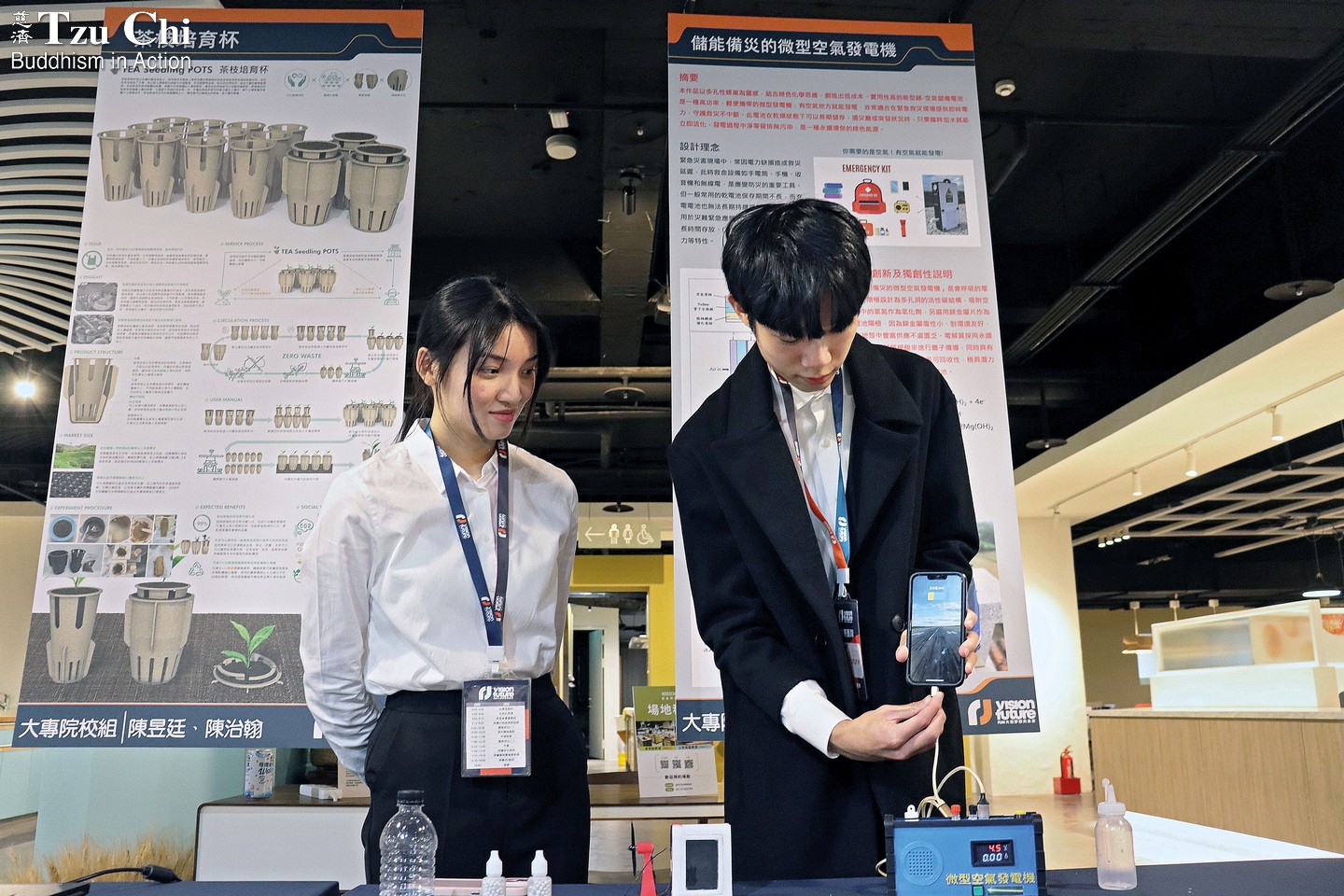
College students Xiao Cai-xuan (left) and Lai Ting-kai (right) collaborated to create a device capable of converting and storing energy. This device can quickly provide electricity during natural disasters or mountain accidents.
Yan Fu-jiang
The “Water Providers” team presents their invention in the final competition of the seventh annual Compassionate Technology Innovation Competition. The team developed a non-electric water purification device that can provide clean drinking water in emergencies.
Liu Wei-xing
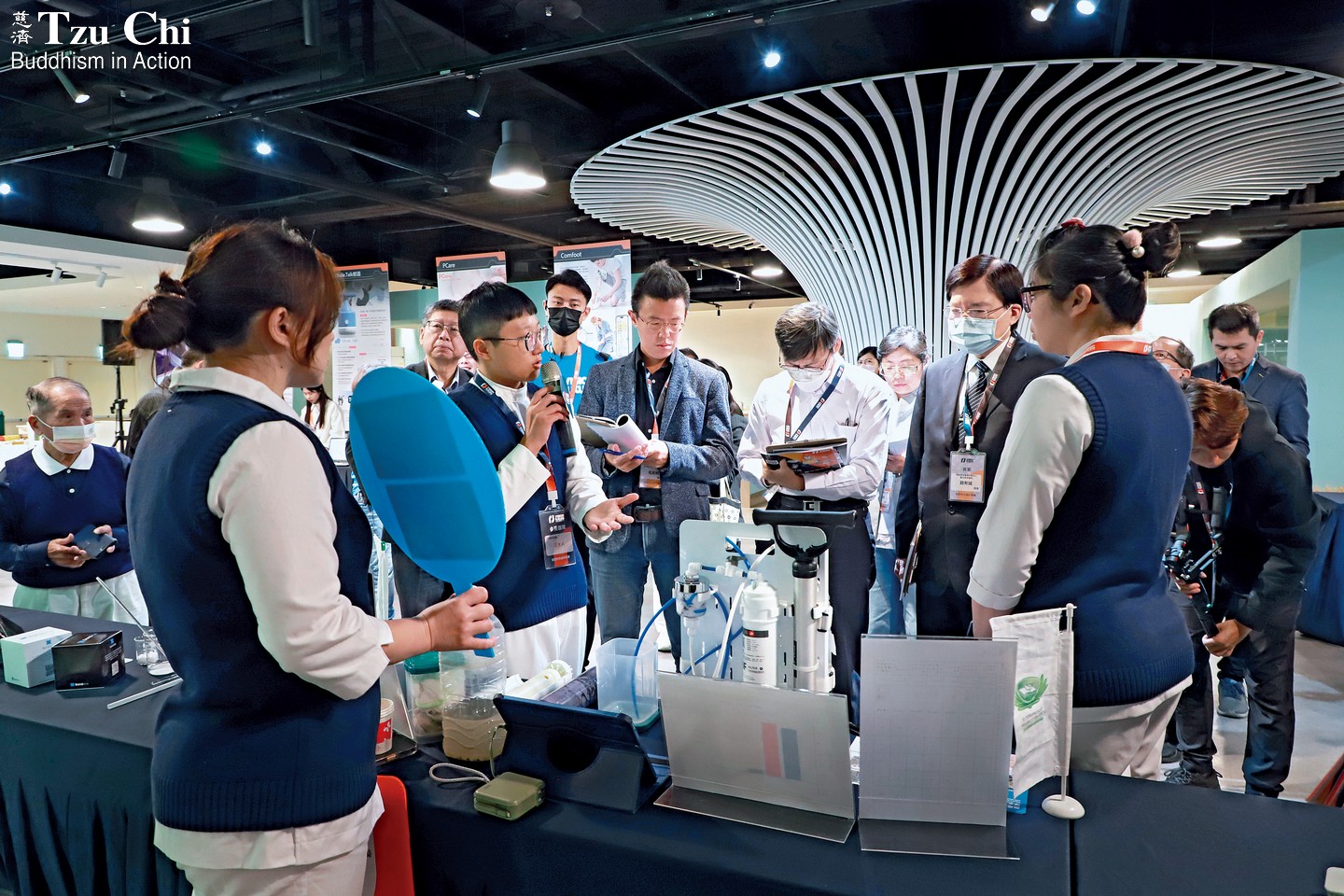
Everyone is a winner
Over a hundred entries had competed for a chance to be selected for the finals of the seventh annual Compassionate Technology Innovation Competition. Sixteen works were selected from the college group and eight from the high school group. The three inventions featured above were among those selected for the final competition, which was held on November 18, 2023, at Taipei’s Plantārium.
After a series of intense presentations and Q&A sessions that day, the top three works from each group were announced, as well as the People’s Choice Award, the Special Enterprise Award, and other special category prizes. Xiao Cai-xuan (蕭采宣) and Lai Ting-kai (賴廷愷), currently studying at National Taiwan Ocean University and Fu Jen Catholic University respectively, won first place in the college group. They invented a device that can convert and store energy, ideal for quickly supplying power to mobile phones or wearable devices during natural disasters or mountain emergencies. A team from Yuli High School, consisting of students Ye Zhen (葉蓁), Wu Bo-yi (吳柏逸), and Zhang Zhi-yan (張芷妍) and their mentor Xu Qi-rong (徐啟榮), developed an earthquake-resistant modular furniture set in response to the high frequency of earthquakes in Taiwan. They garnered first prize in the high school group.
Some of the award-winning works were already physical products, while others were still in the conceptual stage but showed considerable potential for further development. Regardless of their final ranking, every participant who went through the challenging phase of intense mental effort and learned through practical experience was a winner from a learning and growth perspective.
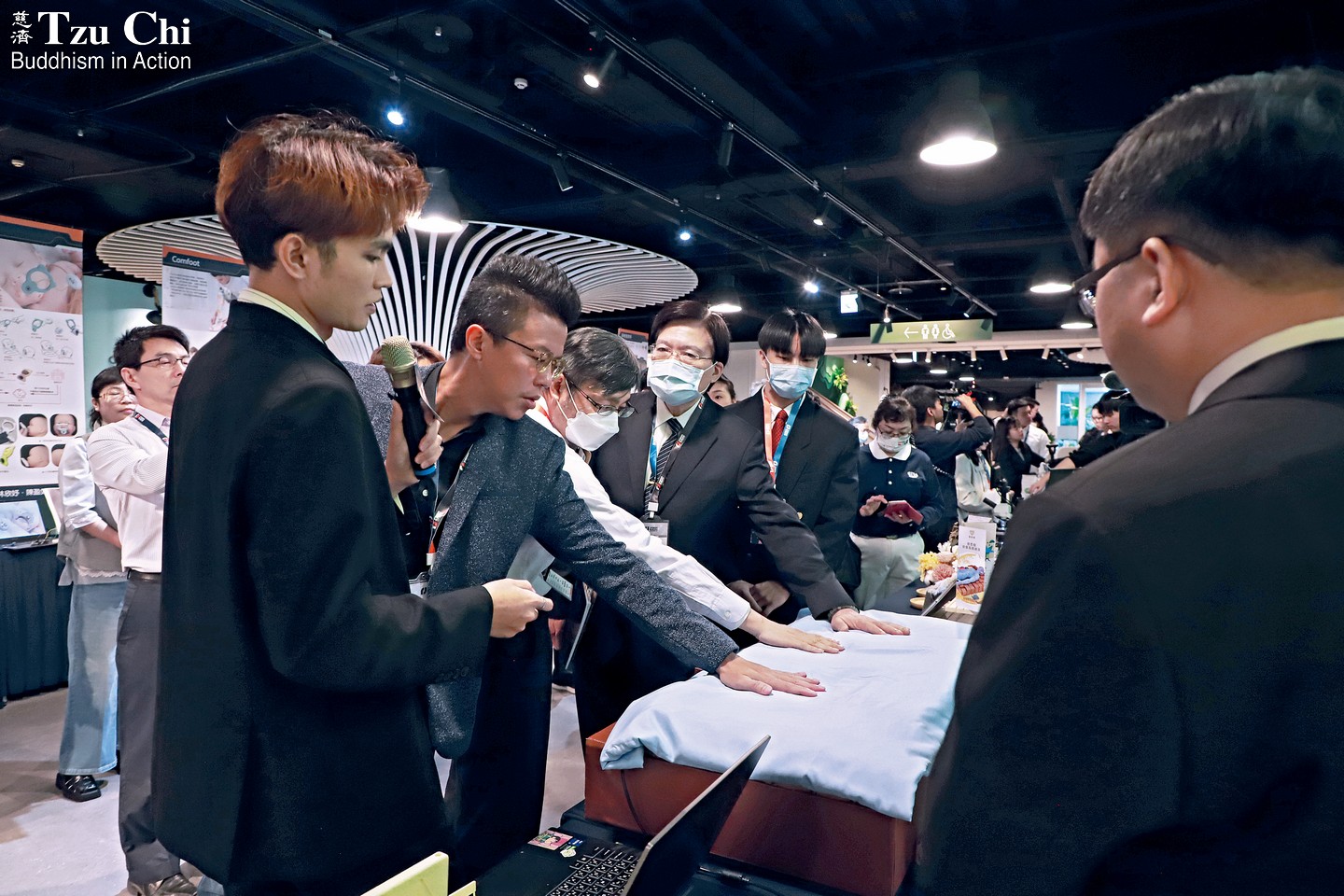
Judges get hands-on experience with the massage mattress for bedridden patients invented by the team from the National Yunlin University of Science and Technology.
Liu Wei-xing
Inspiring creativity for positive change
The Compassionate Technology Innovation Competition, jointly organized by the Tzu Chi Foundation and the Tzu Chi University of Science and Technology, has been running since 2017. It aims to inspire students to use their creativity for positive change. Starting with just over 40 teams in the first year, the competition grew to over 120 teams by the seventh year in 2023. The growth shows that despite facing challenges in our ever-changing world, many young people are determined to pursue their dreams of making a difference.
Participants showcase their creativity in two main areas: charity and healthcare. Teams interested in charity focus on disaster prevention, preparedness, relief efforts, or projects that can improve the livelihoods of disadvantaged people or promote community and environmental sustainability. Those interested in healthcare work toward supporting the elderly and the weak, improving long-term care, or developing products that can enhance the safety and well-being of patients.
Entries must adhere to at least two of the 5 R’s of sustainability: refuse, reduce, reuse, repurpose, recycle. Lo Wen-jui (羅文瑞), president of the Tzu Chi University of Science and Technology, explained: “Many products consume a lot of resources and cause significant pollution during their development and mass production. That’s why we require that our contestants make environmental protection a key consideration in their creative inventions.”
Last year’s competition began with registration on May 1, 2023. It attracted over 120 teams, with 24 teams ultimately selected to enter the finals. Each finalist made thorough preparations to present their creation and answer the judges’ questions during the final competition on November 18, aiming to achieve a good ranking and win prize money.
Judges assess entries based on aspects such as practicality, ease of use, reasonable pricing, and market acceptance. They also provide feedback and advice to each team. Superintendent Chao You-chen of Taipei Tzu Chi Hospital emphasized during the final competition on November 18 that there will always be winners and losers in any competition. He said, “If we compete on who weighs the heaviest, I win, but if it’s about who is the youngest, you win. If the announced results differ from your expectations, keep in mind that your win or loss is just a matter of perspective. While some competitions focus on commercial value, we emphasize compassion and care for the disadvantaged or the Earth.” He affirmed that everyone’s creative ideas already had a good start. “Perhaps one of you here today will become another Bill Gates,” he added. “When that day comes and your pockets are full, remember that your initial intention was to help others.”
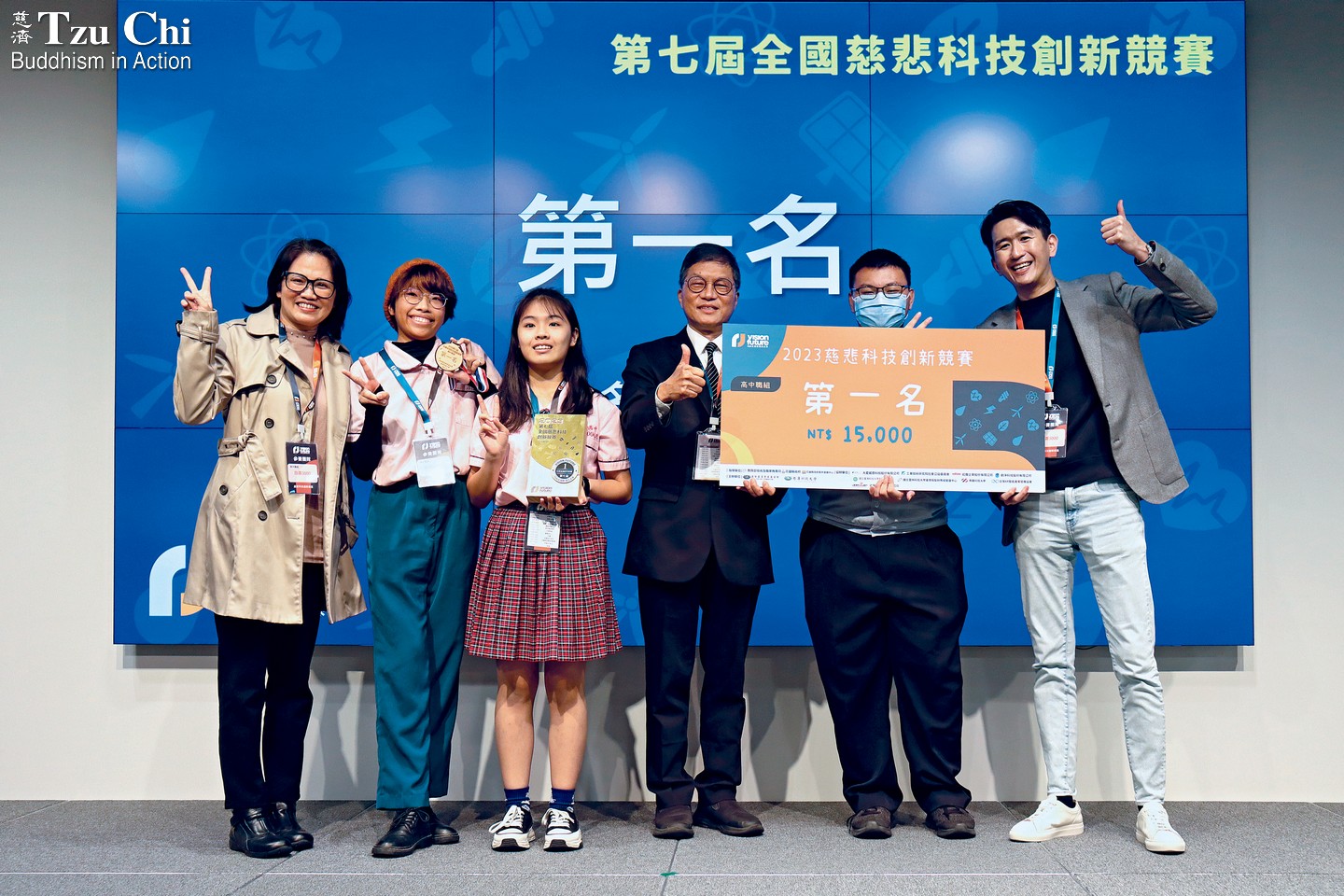
The Yuli High School team developed an earthquake-resistant modular furniture set in response to the high frequency of earthquakes in Taiwan. They clinched first place in the high school group. Deputy CEO Scott Liu (third from right) of the Tzu Chi charity mission posed with the team during the award ceremony.
Yan Fu-jiang
Compassion at the core
Professor Pan Zhi-long (潘志龍), who led the team from the National Yunlin University of Science and Technology, highlighted the current emphasis in education on bridging the gap between learning and practical application. He noted that recognition or awards in national or international contests like the Compassionate Technology Innovation Competition can significantly benefit students’ future academic and career paths.
President Lo Wen-jui added that when it comes to invention and product development, student teams cannot compete with well-funded companies in terms of financial resources, equipment, and technology. But though the ideas and prototypes the students present may be unpolished, he still encourages everyone to engage in innovative research and development. Scott Liu (劉效成), deputy CEO of the Tzu Chi charity mission, on the other hand, remarked that innovation does not necessarily mean inventing new things. “It can be about integrating existing technologies with compassionate thoughts and the needs of mankind, enabling the technologies to have a greater positive impact.”
Compassion is at the core of compassionate technology development as encouraged by the competition. Its focus is on whether technology can help people find relief from suffering and attain happiness while being friendly to all beings on the Earth and beneficial to the environment. Innovation and development driven by an altruistic heart have unlimited potential. Tzu Chi invites warm-hearted and creative young individuals to participate in this competition for kindness, contributing their love and wisdom to benefit the world.

